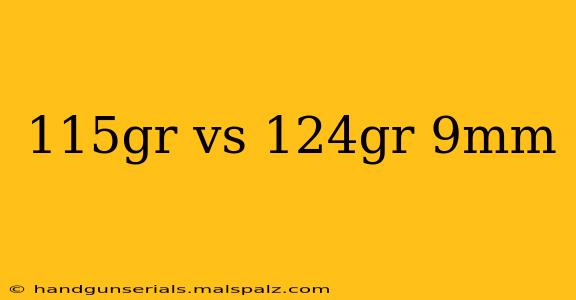The seemingly small difference between 115-grain and 124-grain 9mm ammunition can significantly impact its performance. Choosing the right grain weight depends heavily on your intended use – self-defense, target practice, or competition. This detailed comparison will help you understand the nuances of each and make an informed decision.
Ballistic Differences: Velocity vs. Recoil
The most prominent difference between 115gr and 124gr 9mm ammo lies in their velocity and recoil.
Velocity:
-
115gr: Generally boasts higher muzzle velocity. This translates to a flatter trajectory at longer ranges, potentially leading to increased accuracy at distance.
-
124gr: Typically exhibits lower muzzle velocity. This results in a slightly more arcing trajectory.
Recoil:
-
115gr: Produces more noticeable recoil due to its higher velocity. This can be a factor for shooters with less experience or those sensitive to recoil.
-
124gr: Offers softer recoil, making it potentially more comfortable for extended shooting sessions and preferable for new shooters.
Accuracy and Penetration
While velocity impacts accuracy, other factors also play a crucial role. Let's examine accuracy and penetration separately:
Accuracy:
Both grain weights can achieve high accuracy levels with the right firearm and ammunition. Ultimately, the shooter's skill and practice are more significant determinants of accuracy than the slight grain weight difference. Factors like barrel length also have a substantial effect.
Penetration:
-
115gr: Often provides less penetration than 124gr, especially in barrier penetration tests (e.g., going through drywall or car doors).
-
124gr: Generally demonstrates greater penetration due to its higher mass and lower velocity. This can be advantageous in self-defense situations where penetration through barriers is crucial.
Self-Defense vs. Target Practice
The choice between 115gr and 124gr often hinges on the intended application:
Self-Defense:
The "best" grain weight for self-defense is a subject of ongoing debate. Many argue that 124gr offers superior penetration, making it a more reliable option when facing threats behind cover. However, the higher velocity of 115gr can result in more rapid incapacitation, particularly if a vital organ is struck. The bottom line: both are effective; choose what you are most comfortable shooting accurately.
Target Practice:
For target shooting, the choice is largely a matter of personal preference. The softer recoil of 124gr can be an advantage during extended practice sessions. However, 115gr's higher velocity may be preferred for those prioritizing the flatter trajectory for longer-range practice.
Choosing the Right Ammunition
The decision ultimately comes down to individual needs and preferences:
-
New Shooters: 124gr might be more comfortable due to reduced recoil.
-
Experienced Shooters: Either weight can be suitable, allowing for tailored selection based on the specific application.
-
Self-Defense Focus: Consider the trade-off between penetration (124gr) and potentially faster incapacitation (115gr). Consult with experienced firearms instructors and law enforcement professionals for personalized advice.
-
Target Shooting Focus: Personal comfort and desired trajectory should guide your decision.
Remember always to consult your firearm's manual to ensure compatibility with different grain weights. Safe and responsible firearm handling practices are paramount. This information is for educational purposes only and should not be considered professional firearms advice.

